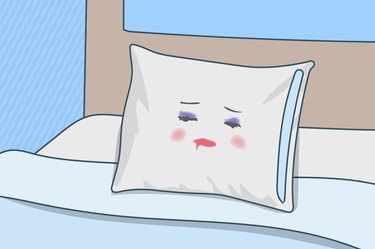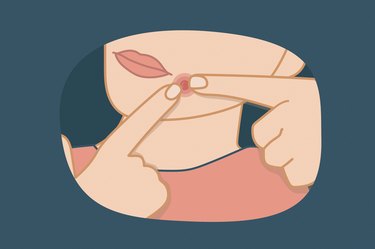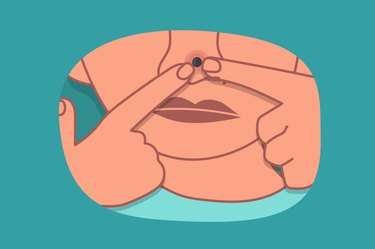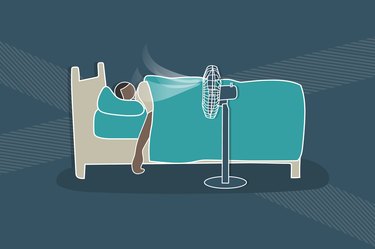
Waking up after a long or crazy night, you stumble into the bathroom and see the evidence right away: Dark, smudgy eye circles, uneven colored skin, and maybe some smudged lipstick that made its way off your lips. Yup, you conked out with your makeup on. And yes, you know it's not the best move for your skin. But what's the worst that could happen?
Falling asleep every once in a while without washing your face isn't going to wreck your complexion. But you'll start to notice the effects if it becomes a regular habit.
Video of the Day
Video of the Day
1. You Might Break Out
"If you fall asleep with makeup on regularly, it can cause sensitivity or irritation of the skin and also lead to clogged pores and acne breakouts," says Marisa Garshick, MD, assistant clinical professor of dermatology at Cornell-New York Presbyterian Medical Center.
2. You Risk Eye Irritation and Infection
Regularly dozing off with eye makeup can be particularly problematic.
"Eye makeup can clog the oil glands in your eye lashes and cause them to become inflamed," says Norman Shedlo, OD, an optometrist with the Eyecare Center of Maryland. "Regularly sleeping with eye makeup can also make you prone to eye allergies, lid irritation and possible infection."
What to Do if You Fall Asleep With Makeup On
If you went to bed without washing your face, you should make it a priority to remove your makeup as soon as you can the next morning. "It helps get rid of any buildup, oil or residue from the day prior," Dr. Garshick says.
Plus, starting the day with a clean face and fresh makeup just feels better.
Here's how to get off all the gunk and manage any eye irritation you might be dealing with:
1. Remove Your Contact Lenses
If you slept in your contacts too, take them out before you start taking your makeup off, Dr. Shedlo says. Make sure to wash your hands first, to prevent any bacteria on your fingers from getting into your eyes.
2. Remove the Makeup With Cleansing Balm or Micellar Water
A dedicated makeup remover will help break up oil-based cosmetics gently, making it easier to fully wash them off without further irritating your skin.
"It's important to be gentle and avoid harsh scrubs or vigorously rubbing the skin, as this can cause irritation and disrupt the skin barrier," Dr. Garshick says.
Both Drs. Garshick and Shedlo are fans of micellar water, which eliminates dirt while helping skin stay hydrated. "It's especially good for those with dry skin," Dr. Garshick says. She recommends Simple Kind to Skin Micellar Cleansing Water ($7.50 for 2, Amazon).
Those with normal to oily skin can try a cleansing balm, such as Glow Recipe Papaya Sorbet SmoothingEnzyme Cleansing Balm & Makeup Remover ($32, Sephora). "It's designed to help remove excess oil, makeup and dirt and is formulated with papaya enzymes to gently exfoliate and improve skin tone and texture," Dr. Garshick explains.
As for disposable makeup wipes? They're fine to use once in a while if you don't have any other options, but try not to reach for them on a regular basis, Dr. Garshick says. All that rubbing and tugging can be tough on your skin.
3. Wash Your Face
After a first pass with the makeup remover, wash your face with a gentle, water-based cleanser to remove any leftover residue. Dr. Garshick likes CeraVe Hydrating Cream-to-Foam Cleanser ($12.79, Ulta.com) for dry skin and Thayers pH Balancing Daily Cleanser ($14.99, Target.com) for normal to oily skin.
After rinsing, pat — don't rub! — your skin with a clean towel. "An already-used washcloth can just transfer residue back to the face," Dr. Garshick says.
4. Soothe Your Eyes
Sleeping with makeup can leave your peepers red, pink or irritated. If that's the case for you, rinse out lingering debris in your eye with a sterile saline eyewash, Dr. Shedlo recommends. Try Bausch & Lomb Advanced Eye Relief Eye Wash ($7.99, Amazon).
Applying artificial tears throughout the day should help the redness ease up. If your eyes are puffy or itchy, apply a cold compress to help take down the inflammation, he adds.
5. Wash Your Pillowcase
There's a good chance that oil and makeup debris from your face was transferred onto your pillowcases while you snoozed. To keep the gunk from getting back onto your skin tonight, toss the pillowcases in the wash, Dr. Garshick recommends.
Related Reading
How to Remove Makeup Before Bed
Taking off your makeup before you go to sleep is a good habit to get into, but it's not complicated. You should follow the same cleansing steps above, say Drs. Garshick and Shedlo.
The only difference? You won't need to worry about soothing any eye irritation or washing your pillowcases. Just remove your contacts if needed, remove your makeup with micellar water or a cleansing balm and wash your face. Then apply your moisturizer or other products as normal, and hit the hay.
So, How Bad Is It Really to Sleep in Your Makeup?
Falling asleep with makeup on once in a while isn't the end of the world.
"We're all guilty of being too tired to take it off sometimes," Dr. Garshick says. But you'll start to notice an effect on your skin if it becomes a habit. "With time it can lead to breakouts and irritation," Dr. Garshick notes.
You might set yourself up for eye discomfort or infections too. "Makeup chemicals and pigments can stain the white part of the eye and can also migrate into the puncta and nasolacrimal duct," Dr. Shedlo says. "This can lead to chronic tearing, chronic inflammation and an infection that may require surgery to treat."
Is this an emergency? If you are experiencing serious medical symptoms, please see the National Library of Medicine’s list of signs you need emergency medical attention or call 911.



